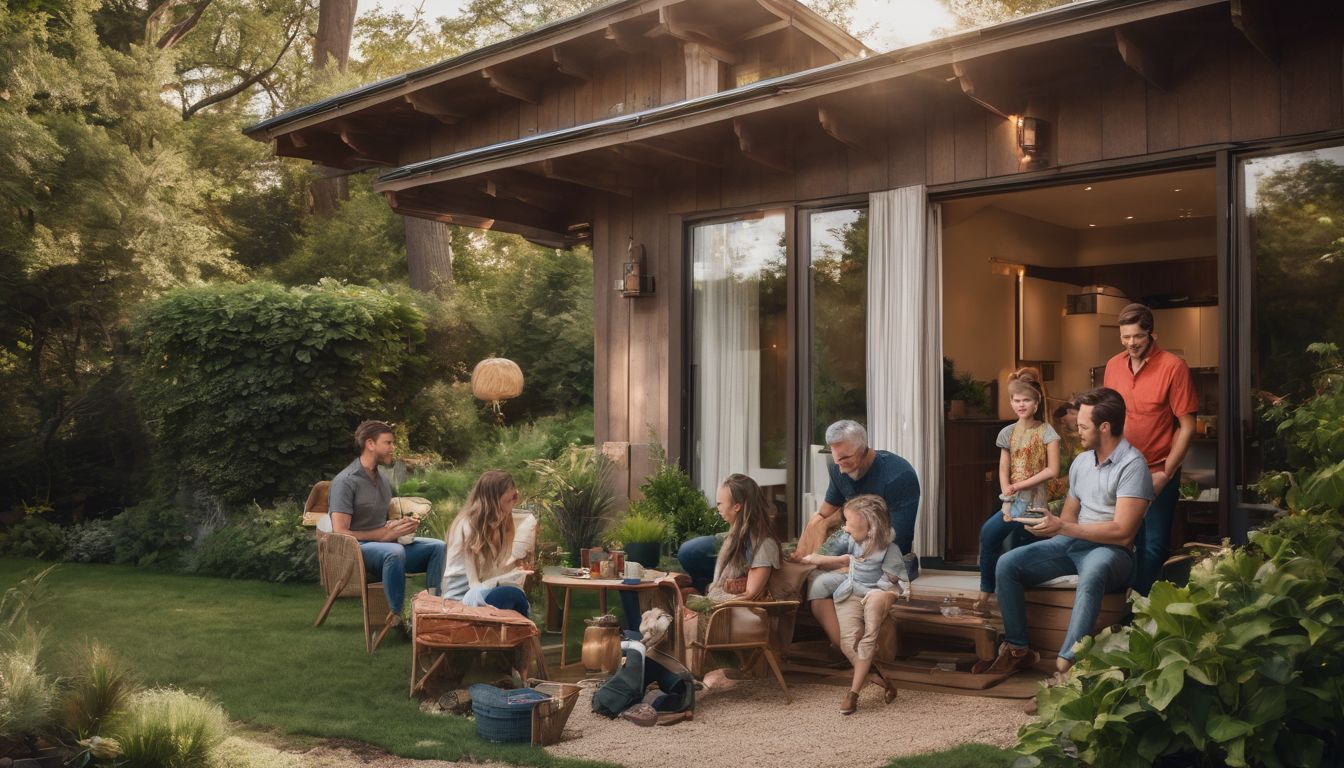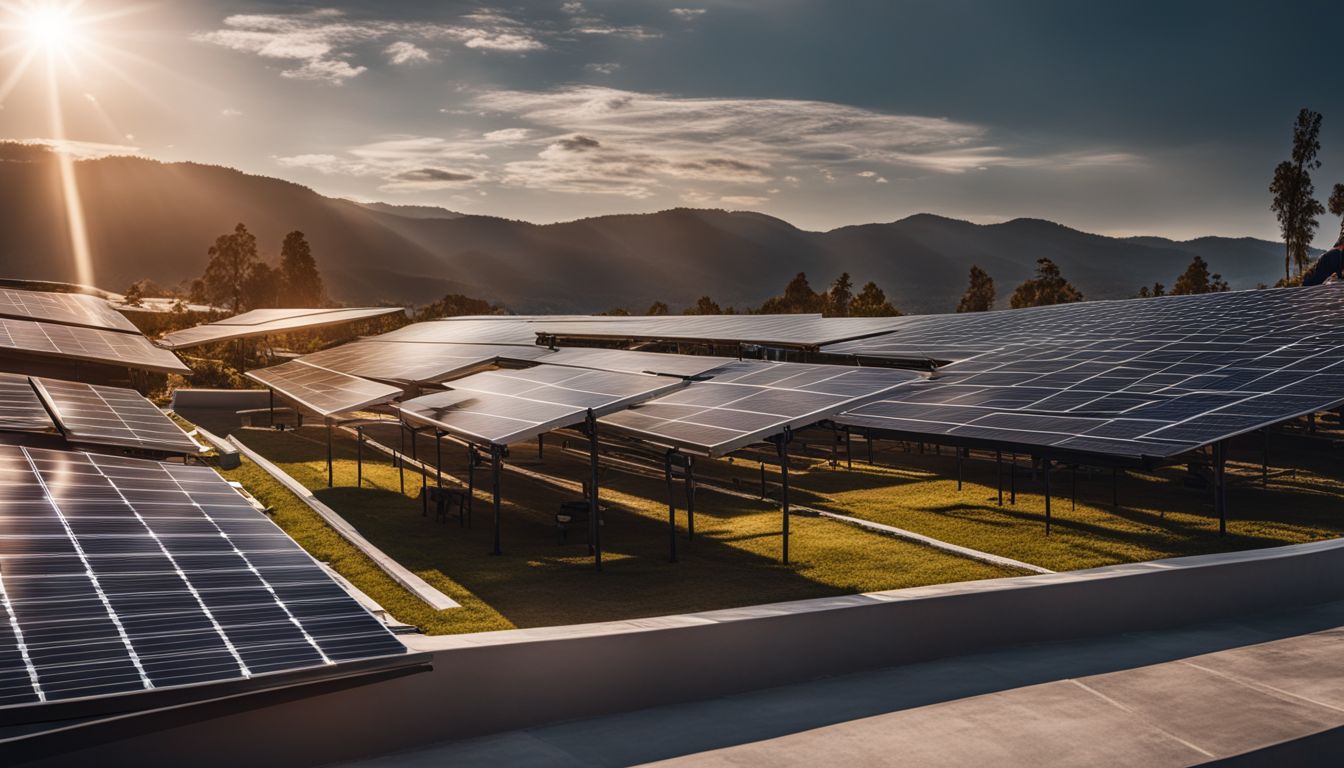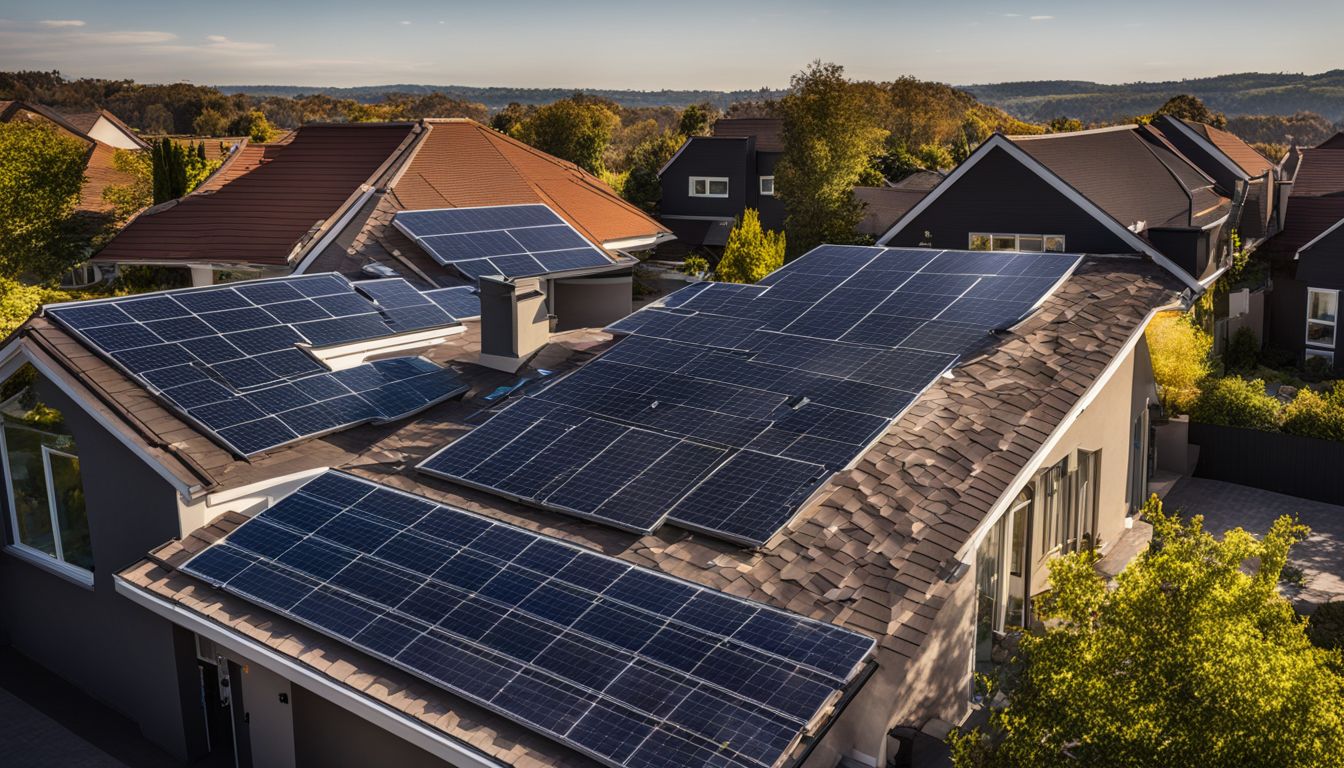Will solar panels run a whole house?

Are you wondering if your home can be powered entirely by the sun? It's possible—solar panels can indeed supply enough energy for an entire household. This article will uncover how a solar power system could meet all your domestic energy needs, providing insights into the practicalities and considerations involved.
Stick around to see how harnessing sunlight at home isn't just a bright idea; it's doable!
Key Takeaways
- Solar panels can indeed power a whole house if there are enough panels to match the home's energy needs. Factors like monthly energy use and how much sun the area gets matter a lot.
- Storing solar power in batteries or using net metering lets homes run on solar even when it's dark, making full-time solar power possible.
- The cost of going solar depends on things such as how many panels you need, which is based on your home's energy use and the sunlight you get. On average, installing solar can cost around $3 to $4 per watt.
- Knowing your roof type and keeping it in good shape is key to getting the most out of your solar panels. Also, larger panels might be better at turning sunlight into electricity.
- Before deciding on solar for your home, think about factors like panel size, efficiency rates, and where you live. This helps figure out if solar energy suits your needs well.
The Basics of Solar Energy

Solar energy is derived from the sun's rays and converted into electricity through solar panels. This renewable energy source is harnessed to generate clean and sustainable power for various applications, including powering residential homes.
https://www.youtube.com/watch?v=khYZTmm7S5I
How does solar energy work?
Sunlight hits solar panels on your roof. These panels have cells that turn light into electricity. This process is called the photovoltaic effect. The energy made can be used right away or saved in batteries for later.
Your home can be powered by this clean energy from the sun, just like it would with power from other sources. It's a smart way to get electricity without making dirty emissions.
The sun gives us a lot of bright light every day. Photovoltaic panels catch this light and make direct current (DC) power. But homes need alternating current (AC) power to work, right?
So, an inverter changes DC into AC power, making it ready to use at home. Even things like air conditioning and LED lights can run on this kind of green energy.
Can solar panels power a whole house?
Solar panels can indeed power a whole house. They take light from the sun and turn it into electricity for all your home's needs. Whether it's lights, TV, or fridge, solar energy can handle it.
But you need enough panels to catch lots of solar energy. This means looking at how much power you use every month and how many sunny hours you get where you live.
You might wonder if solar panels work at night. Well, they don't make power in the dark. Yet with battery storage systems, like Tesla's, you can store extra power made during the day to use when the sun goes down.
So yes, your entire home can keep running smoothly on solar energy alone — day or night! It’s a smart way to harness renewable alternative energy and trim down those electric bills too.
The Reality of Running a House Solely on Solar Power

Fact vs. Myth: Can Solar Energy Really Power an Entire House? Many people wonder if it's possible to run a house solely on solar power, and the answer is yes, with some considerations.
Understanding the reality of relying entirely on solar energy requires a closer look at factors like energy consumption, sunlight exposure, and system efficiency.
https://www.youtube.com/watch?v=YLhlm-iZFVI
Fact vs. Myth: Can Solar Energy Really Power an Entire House?
Solar energy has the power to light up your whole home. It's true that solar panels convert sunlight into electricity you can use. But you need enough panels and sunny days to make up all the energy your house uses.
In some places, people do run their homes only on solar power.
Here's how it works—solar cells in the panels turn light from the sun into DC power. A device called an inverter changes this into AC power for your home to use. If you have more questions about a solar electric system and want a clearer idea if it’s right for you, talk with professionals who install solar systems or look up information on renewables.
They will help match your energy needs with the right number of panels and equipment.
Can I run my whole house on solar energy?
Yes, you can run your whole house on solar energy if you have enough solar panels and batteries. It's all about matching your home's energy needs with the right amount of solar power.
With a well-planned system, even at night or during an outage, your house can keep humming along using stored solar energy.
Think of it like this: the sun gives off rays that your panels catch to make electricity for you. If you capture more than you use in the daytime, batteries will save some for later. So when there's no sun, like at night, you still have power.
This means that with good sunlight and enough gear, living off solar is totally possible!
Can solar panels power a whole house at night?
Solar panels need light from the sun to make electricity. After the sun sets, they stop making power. But if your house has batteries or is connected to the public power grid with net metering, you can still use electricity at night.
Net metering lets you send extra power your solar panels produce during the day back to the grid and get credits. You can use these credits later, like at night when there's no sunlight.
Your home could also store energy produced by solar panels in batteries. This stored power can be used after dark to run things in your house. It's important to know how much energy your home uses so you have enough batteries to last through the night without any problems.
Determining Your Home’s Solar Energy Needs
To determine your home’s solar energy needs, you’ll need to consider factors such as your monthly energy consumption rate, the amount of sunlight your home receives, and the type and number of solar panels required.
These factors will help you calculate how many solar panels you need to power your entire house.
https://www.youtube.com/watch?v=tvTY22Wr4i4
What’s Your Home’s Monthly Energy Consumption Rate?
You'll need to know how much energy your home uses each month. This tells you how many solar panels you might need. The amount of energy used changes with the size of your home and how many people live there.
If you have a big house or lots of family members, your energy use could be high.
Check your electricity bill to see your monthly kilowatt-hours (kWh); this number shows your usage. A small home might use around 200 kWh per month, while a larger one could go up to 800 kWh or more.
Knowing these numbers helps figure out if solar power can run your whole house.
How Many Hours of Sunlight Does Your Home Receive?
Your home's solar power depends a lot on how much sun it gets. Think about where you live and the time of year—it all changes the amount of sunlight your roof sees. On average, places get around 4.5 peak sun hours each day, but this can vary.
You want at least four to five hours of direct sun hitting your panels to really make the most energy.
To figure this out for your house, watch how the sun moves across the sky and see where shadows fall during the day. Trees or tall buildings might block some light from reaching your roof.
The more sunshine that hits directly on those solar panels without any shade covering them, the better they will work to power up your home with clean energy!
What type and how many solar panels does your home need?
To figure out the number and type of solar panels needed for your home, start by considering your monthly electricity usage. On average, a British household requires 15 to 19 solar panels if it consumes around 893 kilowatt-hours per month.
The size and capacity of the panels also play a significant role in determining how many you might need; generating about 11,000 kWh annually could mean needing anywhere from 17 to 42 solar panels.
It's essential to factor in panel rating, production rate, and annual electricity consumption when making these calculations.
Factors Affecting Solar Energy Efficiency
Factors such as solar panel wattage, output efficiency, production ratios, panel size, and sun exposure can significantly impact the efficiency of solar energy generation. Read on to discover how these factors affect your home's solar power potential.
Solar panel wattage
The wattage of solar panels is crucial because it determines the amount of electricity they can produce for your home. Most residential solar panels range from 250 to 400 watts per hour, and their wattage ratings indicate the maximum energy produced when exposed to direct sunlight at 1000 W/square meters.
Therefore, understanding the wattage of solar panels helps in calculating how many panels are needed to power a whole house and ensures that your energy needs are met efficiently. This knowledge also aids in determining the overall cost and budget considerations for installing a solar system.
---
Output efficiency
Solar panel output efficiency is critical in determining how much electricity a solar system can produce. It's influenced by various factors like the size of the panels, their capacity, where they are located, and weather conditions.
An important thing to note is that as technology advances, the efficiency of solar panels has significantly increased over recent years, from about 15% to around 20%. However, it’s also worth knowing that as temperatures rise, a solar panel's output efficiency decreases.
This means that understanding and optimising these factors is essential for maximising a solar energy system's effectiveness in powering your home.
Production ratios
The production ratio of a solar panel system is crucial. It compares the estimated energy output over time in kWhs to the actual system size. This helps determine how efficiently a solar panel system can generate electricity, helping users understand its performance and whether it meets their energy needs effectively.
Measuring this ratio accurately is vital for assessing the effectiveness of a solar panel system and making informed decisions about its suitability for specific energy requirements.
By ensuring that the production ratio aligns with your energy needs, you can have confidence in the efficiency and reliability of your solar panel system. Understanding and monitoring this ratio enables you to maximise the benefits of solar energy while optimising cost-effectiveness, ultimately supporting sustainable and efficient power generation for residential or commercial use.
Panel size
Solar panel size directly impacts energy production. The larger the panel, the more sunlight it can convert into electricity. Factors like available roof space and energy needs determine the ideal panel size for your home.
Smaller panels are suitable for limited spaces, while larger panels offer higher output efficiency and better cost-effectiveness in the long run. Additionally, bigger solar panels generally deliver a higher wattage output per square metre, maximising your energy generation potential.
Considering solar panel size is crucial to ensuring optimal performance and meeting your household's energy requirements effectively. With various options available, selecting the right-sized panels is essential to harnessing maximum solar power efficiency for your home or business.
Where you live and hours of sunlight
The climate in your region significantly influences the number of hours your solar panels can absorb sunlight. Regions with more sunshine tend to generate more energy, while areas with frequent cloud cover or rain might produce less.
Factors such as shading, cloudy weather, and even snowfall can affect how efficiently your solar panels operate on any given day. Thus, understanding the unique sunlight patterns in your area is crucial when determining the feasibility and effectiveness of using solar power to run your house.
By considering local weather patterns and analysing sunlight exposure patterns specific to your location, you can gain valuable insights into how much energy you could potentially harness from solar panels.
Roof type and condition
Different roof types, like flat or sloped roofs, impact the efficiency of solar panels. Installing on a damaged or ageing roof affects their performance. Proper maintenance ensures the longevity and efficiency of the solar panels on your roof.
Different roofs may need different mounting systems for solar panels.
Proper upkeep is crucial to ensuring that your solar panels can function optimally. The type and condition of your roof play a significant role in determining how efficient your solar energy system will be over time.
How to Calculate How Many Solar Panels You Need
To calculate how many solar panels you need, simply divide your desired energy production (in kilowatts) by the wattage of the solar panels. This will give you a rough estimate of the number of solar panels needed to power your home.
If you need further guidance on this, continue reading for more detailed explanations and descriptions.
Desired energy production (kW)/solar panel wattage (kW) = Number of solar panels needed
To find out how many solar panels you need, divide the desired energy production in kilowatts by the solar panel wattage in kilowatts. For instance, if your home needs 20 kW of energy and each solar panel produces 5 kW, then you would require 4 solar panels to meet your power requirements.
This formula helps determine the number of panels needed based on the amount of energy your house consumes and the capability of each individual panel. Factors like available rooftop space, hours of sunlight received, and regional climate also play a key role in deciding how many solar panels are required for your specific needs.
Calculating this crucial figure not only ensures optimal performance but also aids in budgeting accurately for your renewable energy investment.
Cost and Budget Considerations
Considering the cost of solar panels and installation can be daunting, but it's important to weigh the long-term benefits against the initial investment. To learn more about how solar energy can save you money in the long run, keep reading.
How much does one Solar panel cost?
A single solar panel can cost anywhere from £350 to £35,000. On average, a single solar panel may set you back around £16,000. For a complete home system with multiple panels, the average cost ranges from £3 to £4 per watt.
Keep in mind that the actual price will depend on various factors, such as the type and brand of the panel, its size and capacity, installation costs, and any additional features or accessories required for your specific setup.
Given these variables, it's crucial to conduct thorough research and consult with reputable solar energy providers to determine the best option for your budget and energy needs. Understanding the total expense involved in acquiring and installing a solar panel system is essential before embarking on this environmentally friendly journey towards renewable energy independence.
Is solar energy the right option for you?
Considering solar energy for your home? Well, it could be the right choice if you want to cut down on electricity bills and lessen your carbon footprint. Solar panels can increase your property's value while providing long-term savings.
Moreover, they offer energy independence and reduce electric bills. With the lowering costs of solar panels and their potential to save homeowners money in the long run, investing in solar energy might just be the right fit for you.
However, before taking the plunge into solar power, consider factors such as your home's monthly energy consumption rate and the hours of sunlight it receives. Determining these will help calculate how many solar panels are needed for effective electricity generation while keeping maintenance costs in check.
Conclusion
In conclusion, solar panels can power an entire house based on various factors, like energy usage and the number of panels installed. The rising affordability of solar panels makes them increasingly appealing to homeowners seeking reliable and sustainable energy sources.
However, going completely off-grid with solar power necessitates a significant financial and time investment. By calculating specific household electricity usage, one can determine the number of required solar panels for powering a home sustainably.
To understand the financial implications of installing solar panels, read our detailed guide on "how much does 1 solar panel cost".
FAQs
1. Can solar panels power my entire home?
Absolutely, solar panels can run a whole house. By harnessing energy from the sun, they generate electricity to meet all your home's needs if you have the right solar system size and storage.
2. Do I need to live where it's always sunny for solar panels to work?
Not necessarily! Even in less sunny places, as long as there are peak sunlight hours, efficient photovoltaic (PV) systems with energy storage can keep your home powered.
3. Will installing solar panels increase my home value?
Yes indeed—it’s common that homes with a Tesla Solar Roof or first-class solar installations see an appreciable increase in their market value.
4. Is going off the grid with solar power costly?
The initial setup demands investment—aspects like cost per watt and installation fees add up—but incentives exist to lower costs, plus you'll save on energy bills over time.
5. What are microinverters, and why do they matter for running a house on solar power?
Microinverters convert direct current from individual panels into alternating current for use, which enhances overall performance and is essential when demanding electric car charging or using many LED light bulbs at once.
6. Are there different types of residential solar options available?
Certainly! You've got rooftop units like Tesla’s sleek designs or ground-based arrays; even portable modules exist for those needing flexibility—a plethora of choices await any eager homeowner ready to embrace clean energy.











